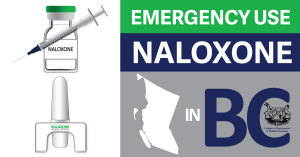
By Maureen McEwan
The topic: British Columbia continues to face an opioid crisis. The province declared a public health emergency last April in response to an increase in drug overdoses and deaths.
In September, Premier Christy Clark announced 10 million dollars to go towards combatting overdoses and drug-related deaths. The BC Ministry of Health is providing 1.1 million dollars to provincial police forces for response training and supplies to better prepare the forces. The department’s documented goal is to ‘improve immediate responses from police to an overdose’ by training municipal and RCMP forces in naloxone administration.
(Please click the link below to view the Ministry of Health’s document)
Naloxone is a medication which ‘reverses the effects of an overdose from opioids e.g. heroin, methadone, fentanyl, morphine.’ It has been used effectively by first responders – paramedics, firefighters, etc. – in emergency situations and has saved lives from fatal overdose.
What’s new: Until December, officers in BC could be investigated by the Independent Investigations Office (IIO) during ‘officer-related incidents of death or serious harm.’ The IIO’s mandate was widely considered as a barrier to officers responding in critical opioid incidents. But the watchdog announced it will no longer investigate when an officer uses Naloxone or CPR in order to save a life. This may allow officers to use their new naloxone training in a crisis more readily.
Why it’s important: The Ministry of Health reports there were over 900 drug overdose fatalities in BC last year- the highest number in decades and the highest in Canada.
Municipal and RCMP forces are gradually being trained Canada-wide but the provincial strategies vary. Several cities, such as Calgary and Toronto, have begun training their municipal forces in naloxone administration. The RCMP has trained many members in different regions. But there are large urban areas without any Naloxone officer training in place.
If the training of BC’s forces improves overdose responses, other provinces may follow. With faster response times, lives could be saved across the country.
What the government says: Sarah Newton works for the B.C Ministry of Health’s Government Communication and Public Engagement Department. She provided a statement on behalf of the Ministry in response to interview requests.
“In B.C., we are doing everything we can to keep people safe, including expanding access to life-saving naloxone.”
The statement confirms that the province provided 1.1 million to fund intranasal naloxone costs and administration training for municipal police and RCMP. The verified funding amount currently stands at 700,000 dollars less than the initial 1.8 million proposed by the provincial government.
What others say: Jason Doucette is a Media Relations Officer at the Vancouver Police Department (VPD). In an email interview, he says the VPD was the first department in Canada to train sworn and civilian members to administer nasal naloxone. The issue and training began in September.
“The supply of naloxone we purchased is good for 18 months. The cost of replacement will be an on-going expense for the VPD every 18 -24 months. The 1.8 million dollars is a good start,” he says, referring to the Ministry’s initiatives.
(Please click below to view the Ministry’s open data file in full).
Doucette adds that the VPD has shared all of its Naloxone training materials with different police agencies across the country.
The RCMP and Toward the Heart did not respond to questions before the article was published. Vancouver Coastal Health – Insite declined to interview.
What’s next: The mayors of the largest cities and several federal cabinet ministers met on Feb. 24 to discuss escalating drug-usage and deaths. They are pledging to work together in response to the country’s overdose crises, with BC leading the task force.
The western province serves as the provincial model in opioid crisis-response. The widespread training of police and RCMP forces in naloxone administration may improve immediate responses in ‘high risk areas,’ as the VPD suggests. As a result, BC could see a decrease in overdose deaths in future.
——————-
For instructor reference:
What is the information?
The information was a request released on January 27th, 2017 to a political party for a financial breakdown from the Ministry of Health. It requested a specific breakdown of the 10 million announced by the Premier to combat overdose deaths in September at the UBCM and the precise initiatives that the funding was allocated to in that proposal.
From which department did these pages come?
The BC Ministry of Health – Open Data Website retrieval.
Why was this information helpful?
The information was helpful because training for naloxone is seemingly sporadic nation-wide. BC has put forth funding and policy in order to facilitate mass training for its municipal and RCMP officers. As legislation around naloxone has loosened in the past year, more and more its use is being seen in major Canadian cities.
There was a discrepancy in the BC funding total which was significant but that could be attributed to a number of factors. It was confirmed through communication with the Ministry as 1.1 million.
The information was also very intriguing in relation to the IIO’s mandate and December announcement. Officers in BC may start to engage more as first responders in incidents of opioid overdose moving forward.
